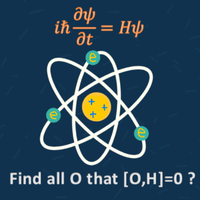Abstract
We present a learning algorithm for discovering conservation laws given as sums of geometrically local observables in quantum dynamics. This includes conserved quantities that arise from local and global symmetries in closed and open quantum many-body systems. The algorithm combines the classical shadow formalism for estimating expectation values of observable and data analysis techniques based on singular value decompositions and robust polynomial interpolation to discover all such conservation laws in unknown quantum dynamics with rigorous performance guarantees. Our method can be directly realized in quantum experiments, which we illustrate with numerical simulations, using closed and open quantum system dynamics in a gauge theory and in many-body localized spin chains.
- Received 20 September 2023
- Revised 14 January 2024
- Accepted 16 February 2024
DOI:https://doi.org/10.1103/PRXQuantum.5.010350
Published by the American Physical Society under the terms of the Creative Commons Attribution 4.0 International license. Further distribution of this work must maintain attribution to the author(s) and the published article's title, journal citation, and DOI.
Published by the American Physical Society
Physics Subject Headings (PhySH)
Popular Summary
From the times of Kepler and Newton, physicists have been finding conservation laws in nature from experimental data. The rapid development of machine learning provides us with new tools to discover conservation laws in a systematic and efficient manner, as was demonstrated in recent work on learning conservation laws from classical dynamical systems. As we are living in a quantum mechanical world, it is natural to ask, Is it possible to discover conservation laws in quantum systems from measurement data? In this work, we answer this question in the affirmative. We propose a learning algorithm for discovering all local conservation laws in unknown quantum dynamical systems, which can be open or closed, with rigorous guarantees.
Our algorithm uses random Pauli measurements to estimate the expectation values of all local observables and then to extract a subspace of operators with a small amount of fluctuation, which corresponds to the conservation laws. Our algorithm is guaranteed to find approximate representations of all conservations laws with sample and computational complexities polynomially dependent on the system size and precision. Moreover, our method is practical for experimental implementation, requiring only random single-qubit measurements.
We anticipate our method to be useful for capturing conservation laws from quantum experiments as well as for certifying quantum simulation results.



